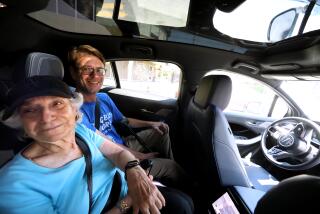Avis Agrees to Equip Cars for Disabled : Consumers: Rental firm is commended by Justice Dept. for its cooperation. Ten other companies also face complaints.
- Share via
WASHINGTON — In a Justice Department settlement that may set a standard for the car rental industry, Avis Inc. agreed Thursday to provide autos with hand controls for customers with disabilities.
Department officials said the voluntary settlement came after complaints were filed against Avis, the nation’s second-largest car rental company, and 10 other rental car firms by people who said they were being denied service in violation of the Americans With Disabilities Act.
U.S. Atty. Gen. Janet Reno, demonstrating the hand controls on an Avis car in the department’s courtyard, commended the firm for its cooperation and said the settlement shows how business can take the initiative to comply with the 1990 law, which prohibits discrimination against people with disabilities.
“I urge other companies throughout America to follow their example,” Reno said. “Barriers must be removed, not only because it’s the law, but because it makes good business sense (and) it’s the right thing to do.”
She said that 10 competitors of Avis, including nationally known and regional car rental companies, are under department scrutiny for similar alleged shortcomings. But she declined to name them.
Officials of Hertz Corp., the largest company in the industry, said they are not involved in negotiations with the Justice Department because they have offered the hand controls for some time. Virginia Carlson, Hertz’s senior staff counsel, said the company provides the specialized vehicles with at least 24 hours’ notice at all of its large corporate rental locations in the United States and Canada.
Under terms of the Avis settlement, the hand-control equipment, which can be installed on most cars in about 10 minutes and later removed, will be available at no extra charge with eight hours’ notice at 20 of Avis’ largest airport counters. At most other large sites, the equipment must be offered with 24 hours’ notice. Smaller or more remote Avis counters will be allowed to require reservations 48 hours in advance.
John L. Wodatch, an attorney in the Justice Department’s civil rights division, said Avis is absorbing the cost of the equipment, which ranges from $200 to $500 per car. He said negotiations with the 10 other companies involve “varying degrees of cooperation.”
If the department cannot obtain voluntary agreements, “we have a whole range of enforcement actions, and we would be willing to take them,” Wodatch said.
An official of the National Organization on Disability in Washington said of the agreement, “It’s welcome news for any person with a disability, and for a company like Avis, it’s good business.”
Avis Vice President John J. Lynch agreed that “it’s good business sense to make Avis’ services available to everybody.”
Joining Reno at Thursday’s demonstration was Sally Conway, an employee of the civil rights division who uses a wheelchair. She showed how a car can be driven with hand controls for the accelerator and brakes. Reno remarked that “this agreement comes on the eve of a holiday weekend when many Americans take to the road to vacation with family and friends.”
Officials said Avis has also agreed for the first time to permit disabled people who cannot drive, such as those with visual impairments or seizure disorders, to be the financially responsible party under a rental agreement in which another person is the driver. In addition, the company will begin allowing people who are unemployed because of a disability and who do not have credit cards to rent cars on a cash basis. Previously, such customers had to show proof of employment.
Title III of the 1990 law prohibits discrimination against people with disabilities using public accommodations, including rental cars. It requires businesses to remove barriers to access where it is readily achievable or can be accomplished without much difficulty or expense.
Under the act, the Justice Department has reached nearly 300 settlements with hotels, amusement parks, bowling centers, health spas, zoos, stadiums and movie theaters.
*
Times staff writer Ronald J. Ostrow contributed to this report.
* DAMAGE WAIVER
An often unnecessary fee can raise rental car costs considerably. D3
More to Read
Inside the business of entertainment
The Wide Shot brings you news, analysis and insights on everything from streaming wars to production — and what it all means for the future.
You may occasionally receive promotional content from the Los Angeles Times.










